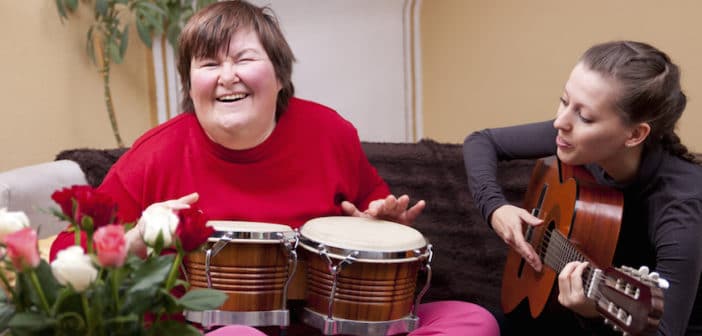 We talk a lot about alternative therapies when we review rehabs for our parent site, RehabReviews.com. You’d be amazed at what falls under the blanket of “alternative therapy.” To give you some indication, both wolf therapy and sand play therapy are real things. And even though music therapy might sound like something Mr. Rogers invented, it’s actually a legitimate form of therapeutic healing for myriad issues, from learning disabilities to Alzheimer’s, and even substance abuse.
We talk a lot about alternative therapies when we review rehabs for our parent site, RehabReviews.com. You’d be amazed at what falls under the blanket of “alternative therapy.” To give you some indication, both wolf therapy and sand play therapy are real things. And even though music therapy might sound like something Mr. Rogers invented, it’s actually a legitimate form of therapeutic healing for myriad issues, from learning disabilities to Alzheimer’s, and even substance abuse.
Tune In to Dry Out
The Boston Herald recently ran a piece on the power of Recovery Unplugged, the latest out-of-the-box treatment to emerge from the infamous southern Florida rehab scene. Addicts down on their luck (and in trouble with the law) are fleeing to this Fort Lauderdale haven in hopes of this unconventional approach to getting sober being the answer they’ve always needed. And the legal part isn’t a joke: this Recovery Unplugged has recently partnered, along with a number of other rehabs across the country, with Massachusetts’ Gloucester police force and their ANGEL Initiative, which we’ve covered before on AfterParty. People potentially facing jail time turn in their drugs and agree to treatment instead.
So far, no one from the Gloucester system specifically has entered treatment at Recovery Unplugged but that doesn’t mean they haven’t had their fair share of New England-born clients. 50 of the 400 people who’ve been treated there are from Boston. This is according to Paul Pellinger, the facility’s chief strategy officer, who cites music’s soul factor as the reason it’s such a powerful healing tool. He told the Herald, “Most centers focus on warning people that they need to follow suggestions, or focus on relapse triggers… but really long-lasting change happens in the soul, and that’s where music comes in.”
The American Music Therapy Association describes music therapy as, “clinical and evidence-based use of music interventions to accomplish individualized goals within a therapeutic relationship by a credentialed professional who has completed an approved music therapy program.” Translation: Music makes you feel good, man. Apparently, singing it, playing it or dancing to it can help individuals of all ages and backgrounds to alleviate stress, express emotions, improve memory and enhance communication skills.
The Rhythm Is Going to Get Who?
I vacillate on how effective I believe this type of therapy to be, if it’s the primary form of therapy in a treatment plan. Music therapy is often an option at adolescent-oriented treatment centers. Perhaps it serves these facilities well because the clients are still young enough to be discovering their own talents? I guess the same could be said for adults whose lives have been dominated by substance abuse for many years. But the kids might still have hope that their guitar skills could make them a rock star, or least the guy all the chicks in high school want to date. Also, assuming they have an actual knack for some aspect of music, it gives them something they want to do more than drugs or booze—whether it’s playing bass or writing raps. And if they don’t have to work a real job yet, they’ve got plenty of time to practice.
I can also see how this type of therapy works well for actual musicians. Have you ever seen a guitar player get lost in his or her own riff? You can clearly see the relaxation settle over their body and face. It reconnects them to their God given gifts, a tangible distraction from the (hopefully former) bad habits.
Singing to Stay Sober
Overall, music therapy seems like a legitimate creative supplement to more traditional evidence-based techniques and 12-step recovery. And if it helps even just one addict stay clean another day, it’s a successful tool. But do I think music is the answer to addiction for everyone? Not necessarily. Of course, I’m sure the results vary from person to person. The team at Recovery Unplugged, which includes longtime Aerosmith collaborator, Richard Supa, claims that of the 400 men and women who have gone through their program since its opening in June of 2015, 160 are still happily clean and sober.
Now some of the graduates just need to form a group. A band that met in rehab is one Behind The Music episode I wouldn’t want to miss.
Sponsored DISCLAIMER: This is a paid advertisement for California Behavioral Health, LLC, a CA licensed substance abuse treatment provider and not a service provided by The Fix. Calls to this number are answered by CBH, free and without obligation to the consumer. No one who answers the call receives a fee based upon the consumer’s choice to enter treatment. For additional info on other treatment providers and options visit www.samhsa.gov.




